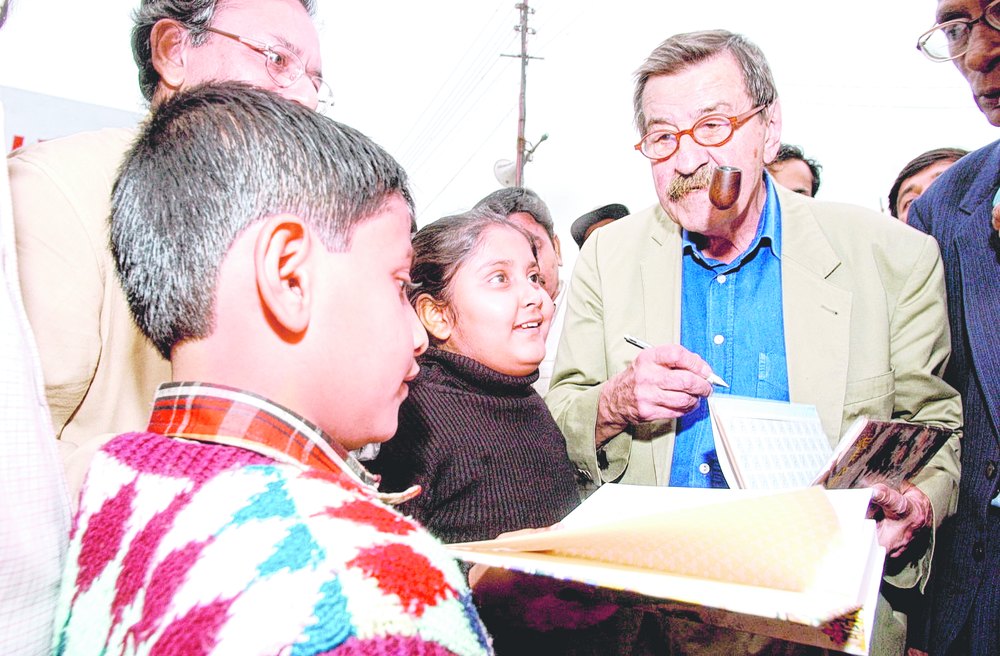
The city was gently sweating under the simmering September sun and Herr Grass was beginning to get obsessed about it. "Walk me through the city you grew up with," he said. "Calcutta keeps calling out to me its siren song."
The year was 1986. This was Gunter Grass's second visit to Calcutta. We became collaborators on a Bangla production of Grass's famous Plebeians Rehearse The Uprising.
We rehearsed on my south Calcutta rooftop from late afternoon to well into the night. In the mornings, I was his guide through the burning streets of my city. He was fascinated by the ruined splendour and the extreme ugliness of Calcutta. This was symbolised for him by the crumbling Gothic mansion housing a rag-tag band of refugees from Bangladesh beside the white bulk of the Ramakrishna Mission, Golpark.
Grass was also beginning to relish the city's culinary flavours. He would sketch something for my daughter Rukmini and bite into endless pieces of cheese on local salted biscuits. Then he would gobble up khichudi, begun bhaja and fried boris. That was all that my wife Shreela could rustle up for 30 famished actors.
"You must do this play without any corporate help. I hate multinationals and Marxists - the parties, not the idealistic young men who die for revolution," he said.
So I took a loan on my provident fund and shovelled that into the production of Biplober Mohora, which ran in and around Calcutta from 1986-1988.
He did not know a word of Bangla, except for the swear words and street abuse that we taught him. But every time I veered off from the Bangla translation of his German text and added some words and phrases of my own, he would jump up from his chair: "Did I put that in my text, Professor Roy?"
Stunned, I would confess that some of the dialogues were my own. "No no, go ahead if it suits the action and character. I just wonder because the rhythm and tones embedded in my German dialogue seemed a trifle different from your Bangla version."
Grass stayed on with us, his theatre family, for over three months.
He invited me to his home and ranch, 50km from Lubeck. On the first day, I asked him "what are the rules I should observe while I am here?"
He said, charmingly: "I make the rules in my house. You don't have to observe any rule, except clean your own shit pot after you finish. I still can't forgive Daud, the refugee poet from Bangladesh who lived here with me but like a Lord insisted that others should clean his commode."
The nights and days with Grass and his family in Lubeck can fill a novel of many chapters. Only two episodes I mention here. Especially troubled by the daughters of his most recent wife, he told me: "Every year or two I plan a fortnight's travel with my ex-wives and 13 children whose age vary from 16 to 40. As a Shakespearean, you will appreciate it if I tell you that in those reunions I always feel very much like King Lear, with all my daughters swarming and squabbling around me."
Another time, he read to me the beginning of his projected play on Netaji Subhas Chandra Bose. "I read up a lot on your Netaji. He had the makings of a fascist but was a remarkable patriot; the only Bengali Shakespearean tragic hero or tragic villain depending on your viewpoint. Germany should know more about him. Calcutta is too full of him. Our job will be to spread Netaji in the West.... We will rehearse on my studio rooftop here, at my ranch and apple orchard and at your Calcutta rooftop. The premiere will be in Berlin and in Calcutta."
Herr Grass, I said, the rehearsals can be in both countries but the play will have to be staged in Berlin. "Calcutta is out of the question. Playing with Netaji is worse than playing with fire in Calcutta. You and I will be lynched by rampaging Bengali mobs."
"But I am celebrating your springing tiger," he said. "Only denigrating him a bit when the dramatic occasion so demands."
"No," I roared in desperation. "Yes," he growled and added a dozen Bangla swear words.
In one of our earlier walks, Grass had told me: "Calcutta is this only place on earth where the classical, the medieval, the modern and the post-modern co-exist, intersect and jostle with each other.... It is the best place for a writer to live and work in."
Roy was a former Shakespeare Professor of English,Rabindra Bharati University, and president, Shakespeare Society of Eastern India











